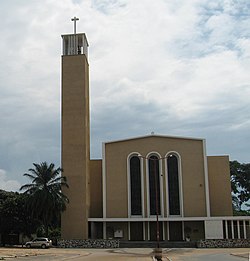Religion in Burundi
[2][3][4] An estimate by the Encyclopedia of Africa in 2010, states that 67% of the Burundi's people are Christians, 23% follow traditional religions, and 10% are Muslims or adherents of other faiths.
[5] The earliest Christian missions arrived in 1879, but the missionaries were killed and the king of Burundi who ruled through 1908 had no interest in foreign theology or imported goods.
[7] The religious institutions within Burundi have both been called upon to help heal social divisions, help end civil chaos after political assassinations, and close wounds of mass violence, but they have also been criticized.
[8] Some, such as Timothy Longman - a professor and director of the African Studies Center, state that the colonial officials and Christian missionaries assumed the people of the newly conquered lands to be "savage and anarchic", then worsened the ethnic divisions within the Burundi society by assuming that "the peoples of the world could be neatly divided into distinct racial categories and subcategories" in order to competitively convert them to Christianity.
[6] Islam arrived in Burundi some 200 years before Christianity through Sunni Arab-Swahili traders active in the Lake Tanganyika region.
